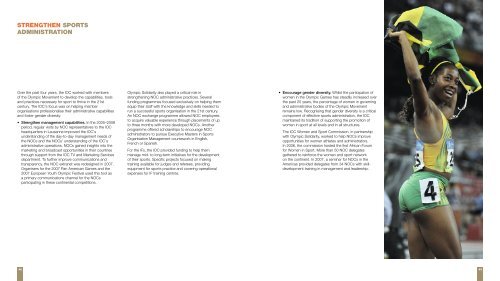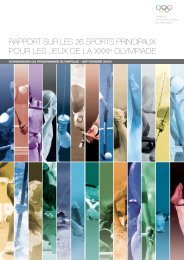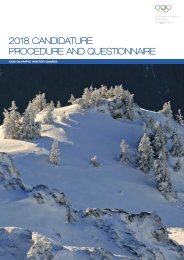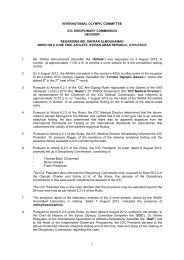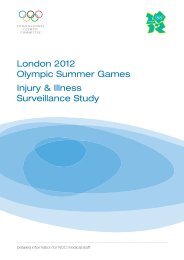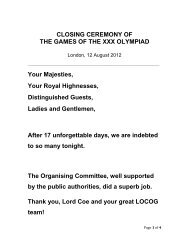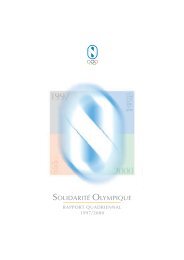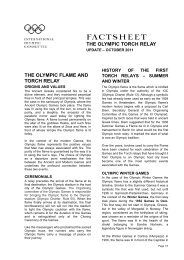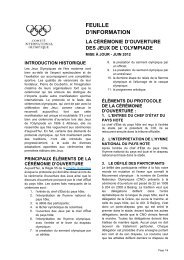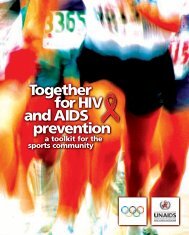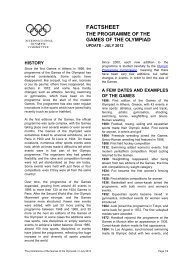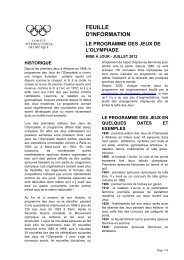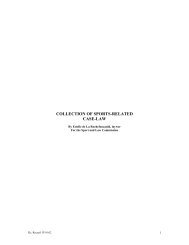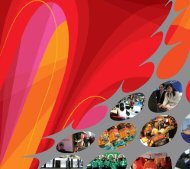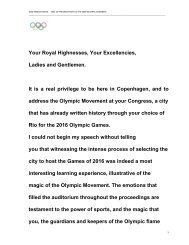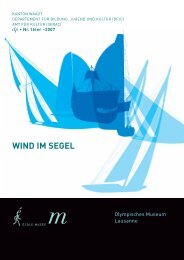3912 reportcomplete final web:layout 1
3912 reportcomplete final web:layout 1
3912 reportcomplete final web:layout 1
Create successful ePaper yourself
Turn your PDF publications into a flip-book with our unique Google optimized e-Paper software.
STRENGTHEN SPORTS<br />
ADMINISTRATION<br />
Over the past four years, the IOC worked with members<br />
of the Olympic Movement to develop the capabilities, tools<br />
and practices necessary for sport to thrive in the 21st<br />
century. The IOC’s focus was on helping member<br />
organisations professionalise their administrative capabilities<br />
and foster gender diversity.<br />
42<br />
Strengthen management capabilities. In the 2005–2008<br />
period, regular visits by NOC representatives to the IOC<br />
headquarters in Lausanne improved the IOC’s<br />
understanding of the day-to-day management needs of<br />
the NOCs and the NOCs’ understanding of the IOC’s<br />
administrative operations. NOCs gained insights into the<br />
marketing and broadcast opportunities in their countries<br />
through support from the IOC TV and Marketing Services<br />
department. To further improve communications and<br />
transparency, the NOC extranet was redesigned in 2007.<br />
Organisers for the 2007 Pan American Games and the<br />
2007 European Youth Olympic Festival used this tool as<br />
a primary communications channel for the NOCs<br />
participating in these continental competitions.<br />
Olympic Solidarity also played a critical role in<br />
strengthening NOC administrative practices. Several<br />
funding programmes focused exclusively on helping them<br />
equip their staff with the knowledge and skills needed to<br />
run a successful sports organisation in the 21st century.<br />
An NOC exchange programme allowed NOC employees<br />
to acquire valuable experience through placements of up<br />
to three months with more developed NOCs. Another<br />
programme offered scholarships to encourage NOC<br />
administrators to pursue Executive Masters in Sports<br />
Organisation Management coursework in English,<br />
French or Spanish.<br />
For the IFs, the IOC provided funding to help them<br />
manage mid- to long-term initiatives for the development<br />
of their sports. Specific projects focused on making<br />
training available for judges and referees, providing<br />
equipment for sports practice and covering operational<br />
expenses for IF training centres.<br />
Encourage gender diversity. Whilst the participation of<br />
women in the Olympic Games has steadily increased over<br />
the past 20 years, the percentage of women in governing<br />
and administrative bodies of the Olympic Movement<br />
remains low. Recognising that gender diversity is a critical<br />
component of effective sports administration, the IOC<br />
maintained its tradition of supporting the promotion of<br />
women in sport at all levels and in all structures.<br />
The IOC Women and Sport Commission, in partnership<br />
with Olympic Solidarity, worked to help NOCs improve<br />
opportunities for women athletes and administrators.<br />
In 2006, the commission hosted the first African Forum<br />
for Women in Sport. More than 50 NOC delegates<br />
gathered to reinforce the women and sport network<br />
on the continent. In 2007, a seminar for NOCs in the<br />
Americas provided delegates from 34 NOCs with skilldevelopment<br />
training in management and leadership.<br />
43


